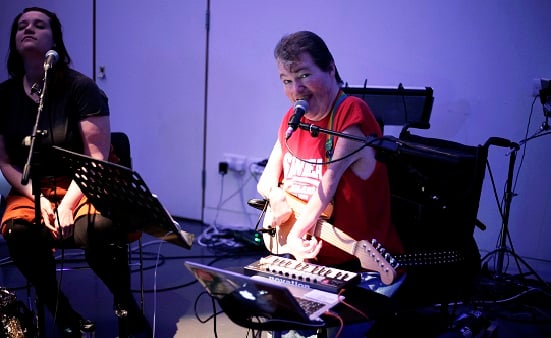
John Kelly plays his 'Kellycaster' guitar at DMLab London's relaunch event
Photo: Becky Morris Knight/Drake Music
Experimental instrument lab re-launched
A new partnership hopes to bring disabled and non-disabled musicians together to create accessible instruments and remove barriers to participation.
A programme for inventing music technologies to support disabled artists relaunched this week, aiming to create a culture where “nothing is impossible”.
Over the past decade, national arts charity Drake Music’s DMLab has developed innovative instruments including a 3D-printed design that turns light signals into sound and a DJ set that triggers samples with the touch of a nose, chin or tongue.
Drake Music is now collaborating with deaf and disabled actors’ theatre company Graeae and the innovation community Music Hackspace to expand this range of technologies.
Drake and Graeae said they share an ethos of challenging the perception that disabled artistry is merely worthy, stressing that it can also be of high quality.
Graeae’s Creative Learning Director Jodi-Alissa Bickerton said the company was pleased to be able to contribute to “this exciting movement for new thinking about the ways in which we can make music”.
Facilitating expression
DMLab was established in 2008 as an “innovation incubator”. Other instruments it has developed include the Rose Conducting Baton – attached to a pair of glasses so the user can conduct with their head – and the Kellycaster, a guitar with a digital patch designed for a disabled musician called John Kelly.
“It’s changed the way I practice as a professional musician,” says Kelly.
“As anyone who plays guitar knows, it’s unlimited in terms of how you can structure a chord. Now that kind of world has opened up to me; I can play chords that express what I hear in my head.”
Kelly, who has been involved with DMLab since 2015, practices six to seven hours a day. The modifications to his instrument are barely perceptible but allow him to play a traditional-looking guitar with limited dexterity, mapping chords onto the patch with one finger.
He said the mainstream music industry is shifting towards recognising the culture and talents of disabled artists – but not quickly enough: “Disabled artists are shouting louder and saying venues need to be accessible.”
Challenges with access
A recent survey of 100 UK musicians by disability-led charity Attitude is Everything found 70% hid their disability from venues, promoters and festivals for fear of negative reactions.
Two-thirds said they compromised their health and wellbeing to play live, and 40% had cancelled a show due to physical access issues at a venue.
Drake’s Research and Development Programme Leader Tim Yates said there was “a real need for a broader variety of accessible instruments so more people can enjoy and excel at music”.
“This could be a simple vibrating percussion box for a young musician or a concert-grade instrument for a professional performer, as well as everything in between.”
Drake Music and its partners support musicians, coders and designers to explore new ideas, no matter how big or small, Yates said.
A community asset
The collective is looking to crowdsource a manifesto for its DMLab programme.
It is hoped the lab will be democratically run and a community asset enjoyed by disabled and non-disabled musicians alike.
Kelly said the key to DMLab is collaboration: “There’s quite a lot of snobbery around music technology that needs to be broken down; that they’re not real instruments.
“It’s not about doing something to disabled people or for disabled people … there is something that’s really important about working together on equal terms.”
Yates invited disabled musicians and “anyone interested in the cutting edge of music tech” to attend a DMLab event.
“See what is possible and dream up wild ideas of where we go next.”
The second DMLab London event will be held at Music Hackspace, Somerset House on 14 August. DMLab North West events will take place in Salford during June and July.
Join the Discussion
You must be logged in to post a comment.